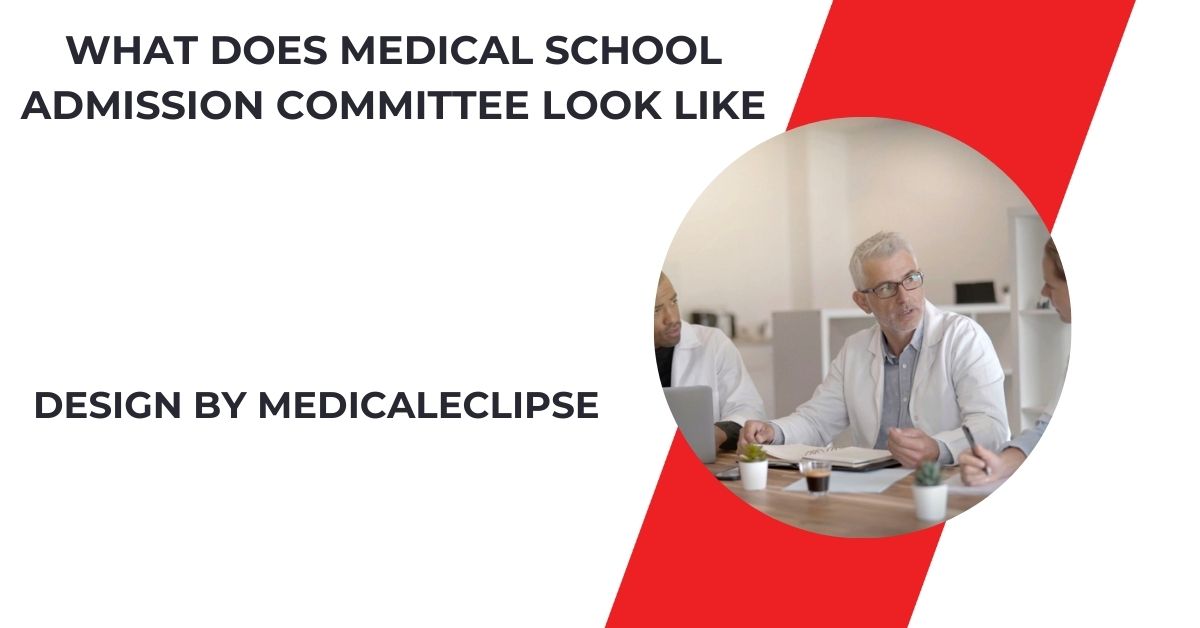Medical school committees seek applicants with strong academics, healthcare experience, community service, leadership, and resilience, indicating readiness for medical school and a career in medicine.
In this article, we’ll dive into the key attributes that make a successful applicant.
Strong Academic Record:

Academic performance is foundational. Admission committees focus on:
- GPA: A high GPA in undergraduate coursework, especially in science courses, shows academic dedication and competency.
- MCAT Scores: High MCAT scores are critical, reflecting your knowledge base and readiness for the rigorous medical school curriculum.
- Trend of Improvement: If your GPA wasn’t stellar from the start, an upward trend can demonstrate resilience and growth, which are valued qualities.
Commitment to Healthcare:
Demonstrating a commitment to healthcare through relevant experience is vital:
- Clinical Experience: Shadowing physicians, working as a medical scribe, or volunteering in healthcare settings shows your dedication to the field and allows you to gain firsthand experience.
- Patient Interaction: Admissions committees want to see that you are comfortable working directly with patients, as medicine is a people-centered profession.
- Research Experience: Involvement in medical research shows a commitment to advancing the field and an understanding of the scientific foundations of medicine.
Community Service and Volunteering:
Community service demonstrates compassion and empathy—qualities essential to medicine. Admission committees look for applicants who have a desire to give back and serve their communities. Long-term commitment to one or more volunteer organizations is often preferred over a scattered record of service, as it suggests dedication and reliability.
Also Read: Bay Area Medical Center Corpus Christi – Comprehensive Cancer Care Services!
Leadership and Teamwork Skills:
As future leaders in healthcare, medical school applicants are expected to have leadership experience. This can be shown through roles in:
- Student Organizations: Positions in clubs, sports teams, or pre-med societies demonstrate responsibility and initiative.
- Team-Based Work: Medicine is a collaborative field, and your ability to work effectively with others in group settings is highly valued.
Strong Letters of Recommendation:

Letters of recommendation provide insight into your character, work ethic, and academic abilities from those who know you well. Quality letters from:
Professors:
Preferably science professors who can speak to your academic skills. They should be able to provide insight into your work ethic, intellectual curiosity, and ability to grasp complex concepts. Their endorsement should reflect your academic consistency and passion for learning. A strong letter from a professor can demonstrate your potential for success in rigorous medical coursework.
Healthcare Professionals:
Doctors or supervisors who can vouch for your clinical experience and interpersonal skills. A letter from someone who has observed your patient interaction and dedication to the healthcare field adds credibility to your practical experience. They can also speak to your professionalism, empathy, and communication with patients and colleagues. Their perspective can provide invaluable insight into your readiness for the clinical demands of medical school.
Research Mentors:
If you have a research background, a letter from a principal investigator can highlight your critical thinking and dedication. They can describe your ability to analyze data, contribute to scientific discussions, and your perseverance in overcoming research challenges. This type of recommendation shows your commitment to advancing medical knowledge and your ability to work independently. Their letter can underscore your potential to contribute to medical research during your medical school journey.
Also Read: Do Medical Coders Have To Be Fast – Fast and Accurate Coding!
Mature and Insightful Personal Statement:
The personal statement is a chance to share your story. Medical school admission committees look for statements that:
- Reflect Your Motivation: Explain why you want to pursue medicine and provide specific examples that sparked or reinforced your interest.
- Highlight Your Unique Qualities: Share aspects of your background, values, or experiences that make you stand out.
- Demonstrate Self-Awareness: Show that you are aware of your strengths and weaknesses and have a plan to address challenges.
Interpersonal and Communication Skills:

Strong communication skills are essential for physicians. This includes:
- Empathy and Listening: Admissions committees want to see that you are capable of listening to and understanding others’ needs and emotions.
- Articulate Expression: During interviews, you should be able to express yourself clearly and professionally.
Resilience and Ability to Handle Stress:
Medical school is challenging, and so is a career in medicine. Committees look for applicants who can manage stress and demonstrate resilience. Examples of how you’ve overcome personal or academic challenges, managed demanding situations, or maintained balance while juggling multiple responsibilities can be powerful indicators of your readiness.
Showing how you’ve developed coping strategies, such as time management and self-care, emphasizes your ability to thrive in high-pressure environments. Demonstrating persistence in the face of setbacks reflects a determination essential for success in both medical school and the demanding healthcare field.
Cultural Competency and Diversity Awareness:
Admissions committees value diversity and cultural awareness, as doctors serve patients from various backgrounds. Showcasing experiences that have broadened your perspective—such as studying abroad, volunteering with diverse populations, or being part of multicultural groups—can demonstrate your sensitivity to the needs of all patient groups.
Highlighting language skills, cultural competencies, or cross-cultural collaboration further emphasizes your adaptability and respect for diversity. This awareness shows you’re prepared to deliver empathetic, personalized care to individuals from all walks of life.
Also Read: How Do I Become A Medical Assistant – Medical Assistant Career Steps!
Realistic Understanding of Medicine:
Finally, admissions committees are interested in applicants who understand what a medical career entails. They appreciate candidates who:
- Have Shadowed or Observed: Hands-on experience shadowing doctors or observing medical settings can provide a clearer picture of what a career in medicine involves.
- Acknowledge Challenges: Discussing the hardships of the profession—long hours, demanding cases, emotional resilience—indicates that you are approaching medicine with a realistic outlook.
FAQ’s
1. What academic qualifications are important for medical school admissions?
Committees prioritize a high GPA, strong MCAT scores, and, if applicable, an upward trend in grades.
2. How does healthcare experience impact my application?
Clinical exposure, like shadowing or volunteering, shows dedication to the field and helps you gain essential patient interaction skills.
3. Why is community service valued in applicants?
Community service demonstrates compassion, empathy, and a commitment to helping others, key qualities for future physicians.
4. What makes a strong letter of recommendation?
Ideal recommendations come from professors, healthcare professionals, or research mentors who can attest to your academic and interpersonal strengths.
5. Why are resilience and stress management skills important?
Medical school and a career in medicine are demanding, so committees value applicants who can handle stress and overcome challenges effectively.
Conclusion
A strong medical school applicant excels academically and demonstrates a deep commitment to healthcare. Interpersonal skills, resilience, and hands-on experience also play crucial roles. By focusing on these qualities, you’ll stand out as a well-rounded, prepared candidate, ready for the challenges of medical school and a successful career in medicine.

Leave a Reply